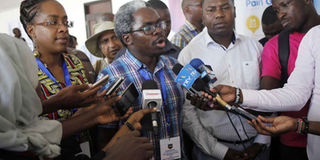Medical association wants Uhuru to drop Cuban doctors deal

Prof Lukoye Atwoli (centre), the Kenya Medical Association’s secretary general, addresses the media after officially opening their annual conference on April 19, 2018 at the Sun Africa Nyali Beach Hotel. PHOTO | LABAN WALLOGA | NATION MEDIA GROUP
What you need to know:
First batch of Cuban doctors is expected in the country in July to help tackle the malaria.
KMA says Kenyan has enough malaria specialists.
Doctors want the president to convene a stakeholder meeting to discuss his plan.
The Kenya Medical Association has urged President Uhuru Kenyatta to rescind his decision to contract 100 Cuban specialists, and instead advertise locally for the jobs.
The medical doctors urged the government to only seek foreign specialists as a last resort measure.
“Advertise locally and if nobody applies, go global to fill the gaps. But don’t take 100 doctors from Cuba and deny Kenyans a chance,” the Kenya Medical Association Secretary General Lukoye Atwoli said.
MALARIA
Prof Lukoye also criticised the government claiming the first batch of Cuban doctors are coming to treat malaria.
Dr Waqo Ejersa, the head of the National Malaria Control Programme at the Ministry of Health, said Kenya is expecting 10 vector control experts and an additional 100 doctors from the communist state, following agreements signed during President Uhuru Kenyatta’s recent visit to the island nation.
“Importing somebody to come and teach us how to treat malaria is preposterous. We have other gaps in other areas like oncology... We don’t have child and adolescent psychiatrists but we can’t get them from Cuba, we will train our own,” said Prof Lukoye.
DOCTORS' PAY
Speaking during the 46th Annual Scientific Conference at Nyali Sun Africa Beach Hotel and Spa in Mombasa, Prof Lukoye said experts do not have details of the deal the government struck with the Cuban doctors.
The medical doctors want President Kenyatta to convene a meeting with experts and stakeholders in the health sector to discuss his plan.
“Doctors are not potatoes that you can go and import from another country and bring here in bulk. The decision to go to Cuba was not professional, it was political,” he said.
Prof Lukoye said they are not aware how much the Cuban doctors will be paid.
“If they get security, furnished housing or transport, then Kenyan doctors will demand for the same. There are ripple effects that come with making decisions without consultations,” Prof Lukoye said.
He said Kenyan medics are not discriminating against foreign professionals, but said the Cuban doctors must be qualified to fill a recognisable existing gap.
“If you get malaria there is a drug, you don’t need a Cuban to tell you how to give the medicine. We drain swamps, prevent mosquitoes from biting people and when they get malaria we give them anti-malaria drugs. That is how we are controlling malaria in Kenya,” Prof Lukoye said.
SHORTAGE
According to Health Cabinet Secretary Sicily Kariuki, Kenya is currently grappling with a shortage of 42,800 health workers, a state of affairs that stands in the way of efforts to ensure universal healthcare.
Currently, there are 63,000 health workers including 20,981 nurses, 3,284 clinical officers, 2,286 medical officers, 405 dentists, 1104 pharmacists, 293 radiologists and 22 radiation protection personnel.
The Health CS said the number of medical doctors is below the World Health Organization recommendation of 23 health workers per 10,000 people.





